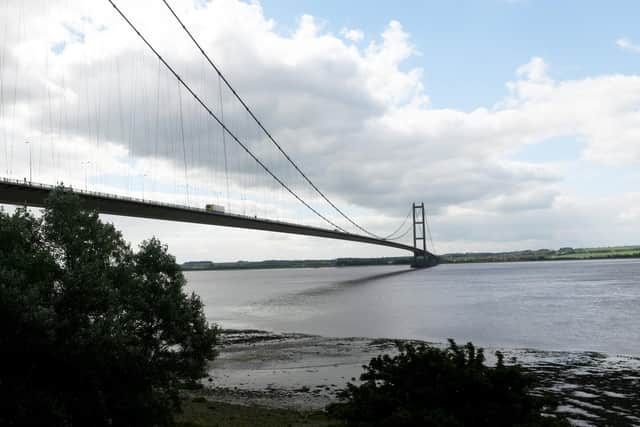Humber Bridge's failure to deliver 'tangible economic returns' offers levelling up warning, say MPs


A report by the Commons Transport Select Committee said the Government “assumes” that infrastructure investment can reduce regional inequalities in the UK but says it is yet to publish detailed metrics that properly define and measure the levelling up concept.
It gave the example of Humber Bridge, which opened in 1981 at a cost of £385m in today’s prices in work that was financed by Government loans.
Advertisement
Hide AdAdvertisement
Hide AdIn 2012, Chancellor George Osborne halved the toll prices for crossing the bridge after the Government wrote off almost 50 per cent of the outstanding £330m debt.


But the report expressed doubt over whether the project has proved worthwhile in economic terms.
It said: “Today, Hull has one of the highest unemployment rates in the country. Although the bridge reduced journey times for the local population and connected families and businesses, it did not produce tangible economic returns.”
The select committee’s report follows last November’s publication of the Government’s National Infrastructure Strategy, which set out five priorities; recovering and rebuilding the whole economy, ‘levelling up’ the country; decarbonising the economy and adapting to climate change; supporting private investment and accelerating and improving the delivery of infrastructure projects.
Advertisement
Hide AdAdvertisement
Hide AdIt named both HS2 and investing £27.5bn in the strategic road network as among the key strands of an “infrastructure revolution”.
But the report warned: “Transport infrastructure projects do not necessarily drive prosperity, especially if one takes account of the costs of construction and operation. Funding a major transport infrastructure project that does not deliver intended benefits can also have adverse consequences, such as increasing greenhouse gas emissions, misallocating taxpayers’ money and wasting Government resources.”
It advised that the Department for Transport “will need to define the “levelling up” policy agenda in a transport context in order to set a benchmark against which to test business cases”.
“To allow Parliament and the public to judge the effectiveness of the Government’s infrastructure plans, the Government must publish detailed metrics that define and measure the “levelling up” concept,” the committee added.
Advertisement
Hide AdAdvertisement
Hide Ad“We are concerned that the Department did not explain how the construction of major transport infrastructure projects can support the “levelling up” policy agenda. We would be reassured if the Department were to set out a worked example illustrating how investment in major transport infrastructure projects drives growth and productivity.”
Tory MP Huw Merriman, who chairs the committee, said: “Successive governments have struggled to deliver major transport infrastructure to time and budget.
“It’s clear that the project management and delivery of these projects could be substantially improved.
“Too many projects start out with early political announcements but no clear view of the finish line. As a consequence, many overrun on time and budget without sufficient accountability.
Advertisement
Hide AdAdvertisement
Hide Ad“We see the benefit of a UK-wide infrastructure programme – we want the public to share that view, too. Government must set out the definition and metrics by which success will be defined.”
He added: “If levelling up amounts to more than rhetoric, then it requires definition and metrics.”
Support The Yorkshire Post and become a subscriber today. Your subscription will help us to continue to bring quality news to the people of Yorkshire. In return, you'll see fewer ads on site, get free access to our app and receive exclusive members-only offers. Click here to subscribe.